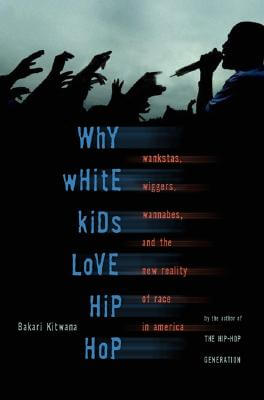Book Review: Why White Kids Love Hip Hop: Wankstas, Wiggers, Wannabes, and the New Reality of Race in America
by Bakari Kitwana
Publication Date: May 31, 2005
List Price: $23.00
Format: Hardcover, 240 pages
Classification: Nonfiction
ISBN13: 9780465037469
Imprint: Basic Civitas Books
Publisher: Perseus Books
Parent Company: Lagardère Group
Read a Description of Why White Kids Love Hip Hop: Wankstas, Wiggers, Wannabes, and the New Reality of Race in America
Book Reviewed by Kam Williams
"Hip-hop is the last hope for this generation and arguably the last hope for America… The best remedy for leaving the old racial politics on the pages of history is a successful hip-hop political movement. Now, more than ever, we don’t have to buy into the old racial politics… This generation, as its cultural movement turns to politics, is creating for us all another choice."
’ Excerpted from Chapter 6, "Coalition Building Across Race"
Is gangsta’ rap a black thing which can only be fully appreciated by African-Americans? Are most hip-hop fans white? What about its message appeals to them? Why did the music catch on in suburbia? Is the industry fated to be dominated by white artists? Is hip-hop just a mass media phenomenon? Has the political perspective of young Americans been influenced by rap? How do they think about race, reparations and affirmative action?
These are some of the questions addressed by Bakari Kitwana in Why White Kids Love Hip-Hop: Wankstas, Wiggers, Wannabes, and the New Reality of Race in America. Mr. Kitwana comes to the subject with what one would presume to be a world of experience, having served as the executive editor of The Source, a popular hip-hop magazine. He has also taught political science at Kent State, served as a music critic on National Public Radio, written for the New York Times and The Village Voice and co-founded the first National Hip-Hop Political Convention.
Regrettably, the impressive resume’ was terribly misleading in terms of what one might expect of this treatise, for it fails, woefully, in its endeavor to initiate any sensible discourse about hip-hop. For instance, on the second page of the Preface, the author states erroneously that members of the Hip-Hop Generation are "the first Americans to live their entire lives free of de facto segregation."
Such a suggestion is patently ridiculous for blacks are still denied access to many spheres of influence. Try to buy a home in, or even to just walk through most lily-white neighborhoods. Realtors routinely steer African-Americans back across the tracks, and profiling police, without a second thought, feel perfectly comfortable stopping and frisking people of color exercising their Constitutional right to travel. If those easy examples don’t amount to de facto segregation, I don’t know what does.
Also in his opening remarks, Kitwana speaks of "the dawning of a new reality of race in America" but fails in his subsequent discussions to point out that there is only one race, the human race. How could any author presume to be a visionary when he himself is still stuck in the past, operating inside archaic, self-limiting constructs which prevent him from ever reaching intelligent conclusions? Does anybody still believe that a black race, a white race, and other races exist? How antediluvian!.
But I digress. Kitwana continues in the Preface to criticize affirmative action and reparations as remedies no longer needed but still being sought by the aging, out-of-touch Civil Rights generation. He insists that Hip-Hop has already forced the country closer to the Jeffersonian notion that, "All men are created equal." More garbage.
As proof, he quotes Donald Trump, who says that, if given a choice, he’d prefer to be a young, black male. "A well-educated black man has a tremendous advantage over a well-educated white in terms of the job market… If I were starting off today, I would love to be a well-educated black, because I really believe they do have an actual advantage today." The Donald couldn’t possibly really believe his own tongue-in-cheek comment, though it might have served him well, politically.
Most outrageous is the author’s dubbing some white woman named Wendy Day as the modern equivalent of Harriet Tubman. And what has this so-called ’hip-hop activist’ done? "Led many black rap artists to the promised land of financially solvent record deals." Sadly, it appears, then, that to the ghetto gangstas it really is all about the Benjamins and the bling and conspicuous consumption they incessantly celebrate in their misogynistic, homicidal rap videos. Nothing deeper than selfish, material goals.
Yes, the opus does get around to delineating why it’s okay for white kids to use the N-word and why they love hip-hop, namely, because of a "growing sense of alienation from mainstream American life." The familiar "teenage wasteland" and "rebel without a cause" refrains revisited. Gee, they embrace rap in "resistance to the status quo." Not a particularly profound insight.
I always wondered whether any academic could make the case for hip-hop, and
I’m still wondering after this underwhelming defense.
Related Links
Bakari Kitwana Interview
http://aalbc.com/authors/Bakari_Kitwana.htm
Hip Hop Book Club
http://hiphopbookclub.com

